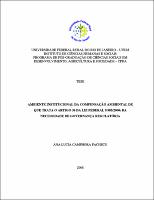Please use this identifier to cite or link to this item:
http://rima110.im.ufrrj.br:8080/jspui/handle/20.500.14407/9556| Tipo do documento: | Tese |
| Title: | Ambiente institucional da compensação ambiental de que trata o Artigo 36 da Lei Federal 9.985/2000: da necessidade de governança regulatória |
| Authors: | Pacheco, Ana Lucia Camphora |
| Orientador(a): | May, Peter Herman |
| Keywords: | compensação ambiental;governança;intituições |
| Área(s) do CNPq: | Psicologia |
| Idioma: | por |
| Issue Date: | 4-Sep-2008 |
| Publisher: | Universidade Federal Rural do Rio de Janeiro |
| Sigla da instituição: | UFRRJ |
| Departamento: | Instituto de Ciências Humanas e Sociais |
| Programa: | Programa de Pós-Graduação em Ciências Sociais em Desenvolvimento, Agricultura e Sociedade |
| Citation: | PACHECO, Ana Lucia Camphora. Ambiente institucional da compensação ambiental de que trata o Artigo 36 da Lei Federal 9.985/2000: da necessidade de governança regulatória. 2008. 47 f. Tese (Doutorado em Ciências Sociais em Desenvolvimento, Agricultura e Sociedade) - Instituto de Ciências Humanas e Sociais, Universidade Federal Rural do Rio de Janeiro, Seropédica - RJ, 2008. |
| Abstract: | Esta pesquisa focaliza o ambiente institucional de implementação da compensação ambiental, na esfera dos licenciamentos federais, no período de 2000 a 2008. O instrumento foi instituído pelo Art. 36° da Lei Federal 9.985/2000, e incide sobre os impactos ambientais não mitigáveis de projetos econômicos, propiciando uma forma de ressarcimento da sociedade por esses danos. Compensações devidas pelo empreendimento são aplicadas em ações prioritárias no benefício de unidades de conservação de proteção integral, constituindo dessa forma, uma fonte não orçamentária significativa para a sustentabilidade econômica do Sistema Nacional de Unidades de Conservação. Os princípios teóricos que norteiam a Nova Economia Institucional auxiliaram no exame das instáveis bases institucionais e administrativas que marcam a gestão do instrumento. Condições de incerteza para o empreendedor e perdas significativas dos recursos destinados às unidades de conservação reportam às precárias bases de governança de seu arcabouço regulatório. Desse modo, a hipótese de que componentes de governança destacam-se como essenciais nos arranjos regulatórios das políticas ambientais foi tomada como eixo analítico condutor desta investigação. A análise das lacunas institucionais do mecanismo, e conseqüentes custos de transação, consistiu na revisão de suas bases legais e normativas, e das condições de ausência de transparência e controle social sobre sua implementação. Com base nesse mapeamento, foram dimensionados desafios de governança específicos dos mecanismos de compensação ambiental, onde grande parte das escolhas e decisões são tomadas em condições onde a incerteza tende a prevalecer. |
| Abstract: | This research focused upon the institutional environment of the implementation of the environmental compensation process within federal licensing procedures, in the period from 2000 to 2008. The instrument was established by Article 36 of Federal Law 9985/2000, to compensate immitigable impacts of development projects, providing a means to indemnify society for these damages. Enterprises environmental compensations are applied toward priority actions to benefit integrally protected areas, constituting a significant non-budgetary source for the economic sustainability of the National System of Conservation Units. The theoretical principles underlying the New Institutional Economics permit an examination of the unstable institutional and administrative structures of the instrument s management. Significant conditions of uncertainty for the entrepreneur and loss of resources destined for protected areas indicate the limited governance prevalent in these arrangements. In this sense, the hypothesis that governance schema are an essential component in the regulatory arrangements of environmental polices was taken as an analytical basis for this investigation. The analysis of the mechanism s institutional gaps, and consequent transactions costs, consisted in a revision of its legal and normative bases, and of the absence of transparency and social control over its implementation. Within this delimitation, the study explored the dimensions of the specific governance challenges in environmental compensation instruments, in which, in large measure, choices and decisions must be made under conditions of uncertainty. |
| URI: | https://rima.ufrrj.br/jspui/handle/20.500.14407/9556 |
| Appears in Collections: | Doutorado em Ciências Sociais em Desenvolvimento, Agricultura e Sociedade |
Se for cadastrado no RIMA, poderá receber informações por email.
Se ainda não tem uma conta, cadastre-se aqui!
Files in This Item:
| File | Description | Size | Format | |
|---|---|---|---|---|
| 2008 - Ana Lucia Camphora Pacheco.pdf | 1.34 MB | Adobe PDF |  View/Open |
Items in DSpace are protected by copyright, with all rights reserved, unless otherwise indicated.

